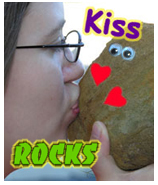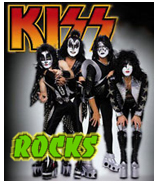|
|
|
  This essay is entitled Kiss Rocks, and it might be of interest to see why I chose that particular title. You see the sentence ‘Kiss rocks’ is open to two wildly different interpretations, depending on whether the hearer was around and conscious in the early 70’s and was more at home with the pet rock or with the glam rock crazes. If I say “Kiss rocks”, with perhaps no particular emphasis on either word, it means one thing; and if I say “Kiss ROCKS!!”, with a lot more on the last one, it means quite another: the former no doubt encouraging a perhaps inappropriate intimate interaction with your lithic pet, and the latter an equally misapplied enthusiasm and a total misunderstanding of pop musicology. The beauty of these conflicting construals being that the noun in one becomes the verb in the other and vice versa and doesn’t that just make one absolutely ...glad that English is not a more synthetic language!
Well, having mentioned Kiss, those Eddie Izzards of the pop world, we must plunge on!
Did you know that one of their songs, Rock and Roll All Nite contains the immortal line “I want to rock 'n' roll all night, and part of every day” and that furthermore there has been a tendency for their listeners to mishear or misinterpret this as “I want to rock & roll all night; and party every day”?
Oh!
Or was it the other way round---now that the spotlight has fallen on them neither seems completely convincing... Anyway, whichever one is the real version, we have thus come, by the pretty way rather than the quick way, to an interesting phenomenon: one which was first brought to my attention as a interesting phenomenon, rather than an excuse to “Tut! Tut!” about stupid listeners, in an essay by Sylvia Wright. It seems that, some time before she wrote of it in 1954, Mistress Wright had misheard a couplet from that wonderful old ballad from Percy’s Reliques ‘The Bonnie Earl o' Murray’ as “They have slain the Earl Amurray and Lady Mondegreen” (presumably one of the Edinburgh Mondegreens, an ancient and otherwise completely respectable lowland family)---but alas for poor Lady Mondegreen, not only was she slain but, to add existentialism to injury, she never was pre-slain in the first place, being no more than a misconstual of “And laid him on the green” giving the unfortunate earl a much more lonely and less romantic end: however in consolation she did give birth to the term ‘mondegreen’ for such mishearings1 .
The world of popular music, where I suppose diction is not the most highly valued of skills, is rife with mondegreens.
Though I suppose the eponymous Lady is not a completely illogical one, most of these mondegreens are totally egregious: one wonders, for example, what is going on in the minds of, presumably, fans who could take Creedence Clearwater Revival’s "There's a bad moon on the rise" from Bad Moon Rising and interpret it as "There's a bathroom on the right".
And then there is the most famous of them all where Jimi Hendrix’s phrase “’Scuse me while I kiss the sky”, a most appropriate sentiment for such a psychodilated performer, was turned into “’Scuse me while I kiss this guy” (making his Experience somewhat more Village Popular than I assume was originally intended).
Even I have found myself guilty of being a bit mondegreenish about the gills. David Bowie’s Rebel Rebel contains the line “Rebel Rebel you’ve torn your dress” which until I started research for this essay I firmly believed was “Rebel Rebel put on your dress”: and you know my version makes a lot more sense than the official one since earlier in that song it is claimed that she, the rebel, has her mother in a whirl not sure if she’s a boy or a girl, and if at that moment she’s actually wearing a dress then someone in that family has more problems to deal with than mere teenage rebellion.
Of course, whether it’s our indeterminately rocky kisses, or a romantic assignation in the bathroom on the right putting on dresses with a guy called Lady Mondegreen, it’s all part of that overpowering drive we have to see patterns; to make sense of things: that deepest of all reasons why we create philosophies and religions and sciences and wild sex scenes out of Rorschach tests ; and that’s what keeps the earl Amurray from dying alone and getting grass stains on his shroud.
Cheerio for now
from Richard Howland-Bolton
|
Notes:
1 And though I prefer the more ringing ‘inadvertent lapsarial contrafacta’ for the phenomenon, in her memory (even though it's a false one) we’ll stick to mondegreens.
Demimonde not so green?

Since researching this essay I have become just a little suspicious of the details of of Mistress Wright’s etymology: you see the version of the BEoM in my copy of Reliques has a “hae” inserted before “layed” so that unless Wright mater had a very slurred rendering of the line (surely she didn’t have to get that inebriated before delving into the book?) one wonders just where the heck the “hae” went to. And then again in Ramsay's Tea-Table Miscellany *, an earlier collection, we also find the line rendered with a “hae”; “hae”, of course, represents the Lalans for ‘have’ and since one vigorously shies away from the notion that, having slain the Earl, anyone then ‘had’ Lady Mondegreen, we must look elsewhere for our origin. Child is no help here since in his version (Number 181) we see not "hae" but "they"!
However I remember as an infant in school learning a version with a tune (see above), and more importantly a version which leaves out any “hae”s or “they”s, and I’m wondering if we are getting a glimpse of a phenomenon akin to someone seeing an article in say People Magazine or Entertainment Weekly and then discovering that it refers to something originally in Nature or Scientific American and henceforth claiming that that is really, really where they did see it first: really.
I mean “I misheard it when Mother read it to me from Percy’s Reliques of Ancient English Poetry” is so much sexier than “I learned it wrong in grade school”
____________________
* The original coffee table book
|
 |
 |
<-- Go Back |
|
|

| Home | Essays | Notes | Gallery | Miscellany | Contact |
All contents including writing, cartooning, music, and photography unless otherwise specified are
copyright © 1965-2023 howlandbolton.com and Richard Howland-Bolton. All Rights Reserved.
All logos and trademarks on this site are property of their respective owners. | Web work* by 
*as distinct from Wetwork
  |
|
|

